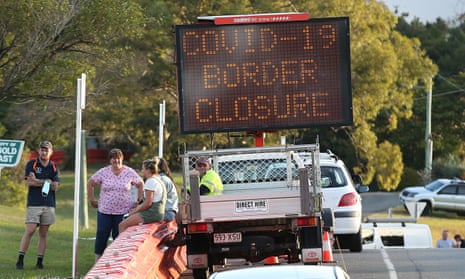After three months stranded in New South Wales, Michael O’Keeffe was finally granted a medical exemption to return to Queensland for specialist surgery on life threatening skin cancers.
But his bureaucratic nightmare continues as health officials insist the Magnetic Island man does not drive across the border to enter hotel quarantine, citing the risk of him taking toilet breaks along the way.
“I told them, ‘I’m happy to piss on the side of the road if it will get me to see my cancer surgeon’,” O’Keeffe says.
The Queensland government says its border measures – the toughest since the onset of the pandemic – have prevented the sorts of Covid-19 outbreaks that have sent NSW and Victoria into lockdown.
The closed border has been politically popular and Queensland remains free of local lockdowns.
At the same time, frustration is growing at the hardline way the border is being managed.
The premier, Annastacia Palaszczuk, last week apologised for a decision to allow the family members of rugby league players to enter the state, while at the same time blocking other arrivals from interstate hotspots.
Stranded Queenslanders say the hardline bureaucratic response to exemption applications or compassionate cases often makes little sense.
O’Keeffe, a retired lawyer, travelled to the NSW Central Coast three months ago to be with his dying mother. He has permission to return but the state is insisting he fly – rather than drive – citing the need to stop for toilet breaks.
“They told me it was too dangerous … and [that] having multiple stops posed a greater risk to the Queensland community,” O’Keefe said.
To reach Sydney or Newcastle airport via public transport, O’Keeffe would have to travel through places where Covid is spreading . He says he would also need to use a public toilet.
He and his wife have drawn up a Covid-safe plan to drive north, including planning no-contact stops in low-risk areas. He even offered to only go to the toilet in the bushes.
The state has repeatedly said no.
“After mum’s funeral, my wife and I were approved to return home in June, but our permits were cancelled, after the Queensland government declared the Central Coast a Covid hotspot,” he said.
O’Keeffe has been a high-risk malignant melanoma patient for about 10 years and requires specialist surgery to remove spots identified by his doctor.
“I can’t get the appropriate surgery in a regional area in NSW. There’s been no objection to the medical evidence, which is very strong, that I have to be operated on and quick, and the best alternative is at home.
“It is clear that these policies are not honestly about lessening the risk to the Queensland community. If that were so, why tell us to come home by a far more dangerous way?”
Authorities have previously told Guardian Australia that people driving into Queensland “presents an unacceptable risk with the potential of stopping along the way, for example, for fuel”.
“Arriving by air with established transport processes ensures people proceed directly to their accommodation,” a health spokesperson said.
Queensland Health said on Monday that: “due to the current risk of Covid exposure anywhere in New South Wales (not just around Newcastle or Coffs Harbour) the Queensland government has issued a direction that requires returning Queenslanders and people relocating to Queensland to fly into Brisbane or the Gold Coast where they will be met by trained staff who have implemented infection control processes in-line with national standards.”
